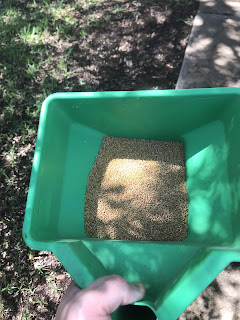My friend Leigh over at Five Acres And A Dream had a lovely time lapse perspective of what they have done to build up their pasture over the years.
I do not have a pasture, but I have a front lawn and a spot in back in need of assistance:
Fortunately, I also have Leigh's recommendation for a book:
Which I highly recommend (as she did). It is a well written book to the non-scientist (that would be me) on the function of soil and how to improve. I would say potential ground breaking (pardon the pun) if adapted.
So I need to build up the soil. The best and easiest thing I can think of is clover. Fortunately, my friends at SowTrue Seed are still shipping. I ordered one lbs of Crimson Clover and 0.5 lbs of White Clover.
Caster in hand, I mixed them up and spread them out:
Here are a couple of shots of the seed spread:
I am not sure that it will take, of course. But I am looking forward to seeing what happens













I did something similar when we were still driving back and forth between here and NC. I should have planted more red clover, but more on that later.
ReplyDeletePlanted several kinds of clover as you did, rye grass, I can't actually remember what all we put out in an effort to help the soil. We even got a soil analysis at one point and still have amendments to add.
None of them really helped with the high clay content, unfortunately, but if we were to plant in the ground again, we would do more. Right now, God is pretty much the gardener in our pasture.
As to the red clover? I am a member of a faceless book group called Louisiana wild edibles, foraging and wild medicinal plants. Red clover is used for a lot of different herbal medicines.
Not that I knew this when we tossed it out to grow; but I've since learned that.
Just throwing that out there, haha.
And of course I expect your rabbits will love it, too! :)
I will check out the book. :)
The book is really quite good Linda, and written at a level I could understand.
DeleteFascinating account. Thank you for sharing. We have a lot clay here too; fortunately, my only intent is a nicer looking lawn so hopefully less overall concern than trying to raise animals on pasture.
Hey - you stole my seed spreader!!! (I have one exactly like it...)
ReplyDeleteAren't you supposed to put peat moss over the seed, TB? And - can you guys grow corn down there...? Supposedly you can up here but I have only seen one or two gardners that can actually do it well...
I know of putting burlap over seed; but we just scattered ours and let nature and God do the rest.
DeleteWe used to try growing sweet corn here. The crows/starlings love it when it first sprouts, so you need something to keep them out.
Then you've got the racoons that LOVE it, and I don't know what else.
We gave up and just buy at the farmers market or store now.
Glen, I have never had success with corn here although I have tried drought resistant varieties for years. I have no idea what I am not doing right as people do grow it.
DeleteThat book was like a light bulb going off in my head. Clover is an excellent idea! Free nitrogen for happy plants!
ReplyDeleteLeigh, I have read a fair amount of references on managed grazing and even no till planting. I have just never had it put as clearly as this book did.
DeleteLinda, on part of my yard (Backyard) I sprinkled a little cover of the wood pellets broken down that the rabbits use for litter. Mostly to keep the birds out. In the front yard, it is just literally lying there. It is all a great experiment anyway!
ReplyDeleteI grow corn to dry it for cornmeal. Sweet corn, when we have it, is purchased.